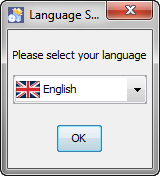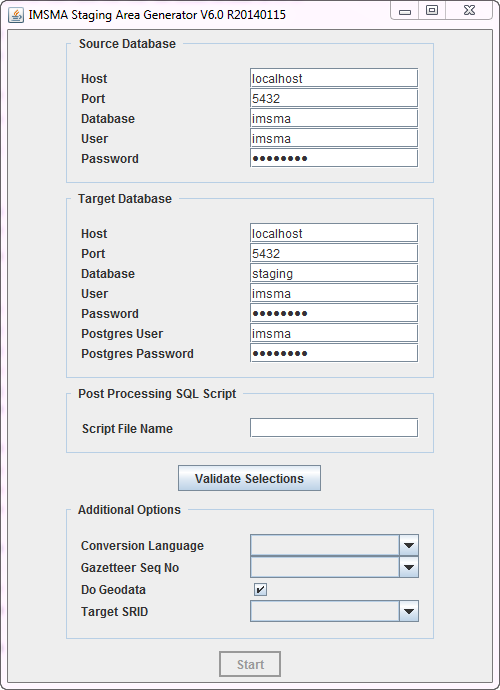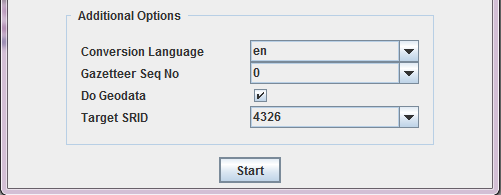Difference between revisions of "Staging Area Generator"
From IMSMA Wiki
| Line 2: | Line 2: | ||
{{Under construction | This page is under construction}} | {{Under construction | This page is under construction}} | ||
The IMSMA Staging Area Generator is a tool that allows to create a staging area from an IMSMA database. It is thus part of the {{IMSMANG}} tool set, but not directly integrated into the {{IMSMANG}} installation package. It thus needs to be installed separately. Please contact your country focal point in order to get the latest installation package. | The IMSMA Staging Area Generator is a tool that allows to create a staging area from an IMSMA database. It is thus part of the {{IMSMANG}} tool set, but not directly integrated into the {{IMSMANG}} installation package. It thus needs to be installed separately. Please contact your country focal point in order to get the latest installation package. | ||
| + | |||
| + | {{Note | The Staging Area Generator can only be used with {{IMSMANG}} 6.0 and above}} | ||
| + | |||
== Installing the IMSMA Staging Area Generator==__NOEDITSECTION__ | == Installing the IMSMA Staging Area Generator==__NOEDITSECTION__ | ||
<ol> | <ol> | ||
| Line 44: | Line 47: | ||
* '''Port:''' port of your target Postgres database server installation - the default is 5432 (which is also the port on which IMSMA is running on the source) | * '''Port:''' port of your target Postgres database server installation - the default is 5432 (which is also the port on which IMSMA is running on the source) | ||
* '''Database:''' this is the name of the staging area database to be created. You can specify any name here, using '''lower-case alphanumeric characters and underscores'''. If a database with the provided name '''does not yet exist''', the SAG tool will create a database with that name on the target database server. If a database with the provided name '''already exists''', the content will be '''dropped''' and '''recreated''' by the SAG tool. If, for any reason, the database cannot be created, an error message will be displayed. Contact your country focal point if you are unsure how to solve that. | * '''Database:''' this is the name of the staging area database to be created. You can specify any name here, using '''lower-case alphanumeric characters and underscores'''. If a database with the provided name '''does not yet exist''', the SAG tool will create a database with that name on the target database server. If a database with the provided name '''already exists''', the content will be '''dropped''' and '''recreated''' by the SAG tool. If, for any reason, the database cannot be created, an error message will be displayed. Contact your country focal point if you are unsure how to solve that. | ||
| − | * '''User:''' this is the username of the database user that should be the '''owner''' of the staging area database. | + | * '''User:''' this is the username of the database user that should be the '''owner''' of the staging area database. The default is imsma - however, this will only work if the staging area is created on the same database server on which IMSMA is running. On another, independent, database, there might not be any user named imsma. In that case, another, existing, user can be provided, or the database superuser named ''postgres'' can be used. |
| − | * '''Password:''' | + | * '''Password:''' password of the above user. |
| − | * '''Postgres User:''' | + | * '''Postgres User:''' the above defined user that was specified as the owner of the staging area database might not have the permissions to actually ''create'' the new staging area database. Therefore, a user with enough permissions has to be provided here. The default is '''postgres''', which is the superuser having all necessary permissions. |
| − | * '''Postgres Password:''' | + | * '''Postgres Password:''' password of the above user - in case of doubt, leave the default (''password''). |
|- | |- | ||
| align="left" | '''3 - Post Processing SQL Scripts''' | | align="left" | '''3 - Post Processing SQL Scripts''' | ||
Revision as of 06:02, 20 June 2014
| This page is under construction |
The IMSMA Staging Area Generator is a tool that allows to create a staging area from an IMSMA database. It is thus part of the IMSMANG tool set, but not directly integrated into the IMSMANG installation package. It thus needs to be installed separately. Please contact your country focal point in order to get the latest installation package.
| |
The Staging Area Generator can only be used with IMSMANG 6.0 and above |
Installing the IMSMA Staging Area Generator
- To install the staging area generator (SAG) double-click on the etl.exe file..
- The graphical installer then starts. On the first screen, choose the language you would like to use for the installation and click OK.
- Navigate the Installation panels of the graphical installer as described below:
- On the Welcome screen, click Next.
- On the Infromation screen, click Next.
- We strongly recommend to use the default installation path for the Staging Area Generator. Click Next.
- If the target folder (C:\IMSMAETLTool) does not already exist a message will be shown, click OK.
- In the packages selection panel, click Next.
- Wait for the installation progress bar to finish, then click Next.
- When the Setup Shortcuts panel displays, click Next.
- When the installation has completed successfully, click Done.
After the installation, the following menu entry will be visible in Start → All Programs → IMSMA:
![]()
Using the IMSMA Staging Area Generator
Basic Principles
Where to use it
The Staging Area Generator Graphical User Interface
To start the Staging Area Generator, click on the Staging Area Generator Icon in Start → All Programs → IMSMA. This will open the following graphical user interface.
| Sections in the Staging Area Generator user interface | |
| Section | Description |
| 1 - Source Database | This section defines the connection of the source database, i.e. the IMSMANG database from which a staging area should be generated. If the source and the target databases should be on the same server, the default connection parameters can be kept. If the staging area is generated on another server, then the IP address of the source server hosting the IMSMANG database has to be provided in the Host field. Remember to update the password in the Password field if you have changed the default imsma password on your IMSMANG installation. |
| 2 - Target Database | This section defined the connection to the target database, i.e. the staging area database to be created. The parameters to be provided are the following:
|
| 3 - Post Processing SQL Scripts | desc |
| 4 - Additional Options |
|
Scheduling the Staging Area creation
| ||||||||||||||


